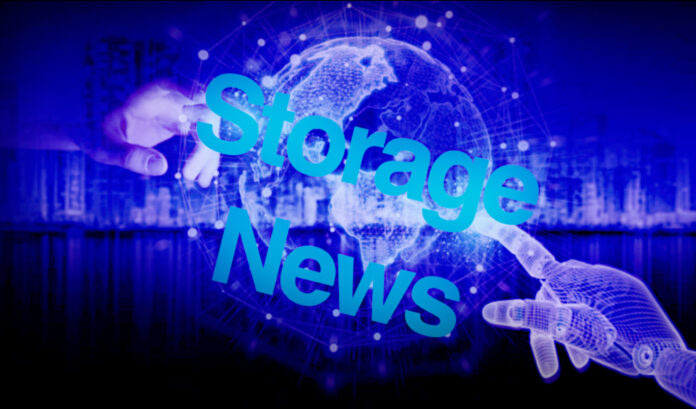Distributed, NoSQL database supplier Aerospike introduced new expression indexes to speed up machine learning, generative AI, and agentic AI workloads while reducing memory use and operational costs. It says most NoSQL databases scan every record for a query, even if most are irrelevant. Aerospike’s approach pushes conditional logic into the index itself, so only relevant computed data is indexed. This cuts memory usage, reduces the number of records to scan, and simplifies application code. More info’ in a blog.
…
Taiwan-based JBOF supplier AIC said ExponTech deployed a single AIC F2026 2RU JBOF supporting PCIe Gen 5, configured with 24 ScaleFlux CSD 5000 SSDs and 4 x Nvidia BlueField-3 DPUs for the MLPerf Storage v2.0 benchmark. It gained the #1 global ranking in ResNet-50 training bandwidth, reaching 23.6 GiB/s per client, with sSupport for 700+ A100 GPU cards and around 400 H100 GPU cards in training scenarios. The product sustained 96%+ GPU utilization during AI workloads. The F2026 can scale to 1,024 nodes, delivering EB-scale capacity and hundreds of TB/s throughput for large-scale AI training, LLM checkpointing, and enterprise HPC.
…
Cloud storage supplier Backblaze announced the Company’s Board of Directors has adopted a stock ownership policy for directors and executives to hold a material amount of company equity, and ensure its leadership is invested in the company’s success. Minimum ownership requirements are as follows:
- Non-Employee Directors — Five times their annual cash retainer
- Chief Executive Officer (CEO) — Five times annual base salary
- Chief Financial Officer (CFO) — Three times annual base salary
- All Executives Reporting into the CEO — One times annual base salary
…
Biwin has a tiny SSD. Its Mini SSD features an advanced LGA (Land Grid Array) packaging technology that integrates the controller and flash memory modules into an ultra-compact form measuring just 15.0 mm × 17.0 mm × 1.4 mm—about half the size of a Euro coin and about the size of a microSD card. It says the design ensures broad compatibility with a wide range of devices, including laptops, tablets, smartphones, cameras, NAS systems, smart albums, and portable SSDs.
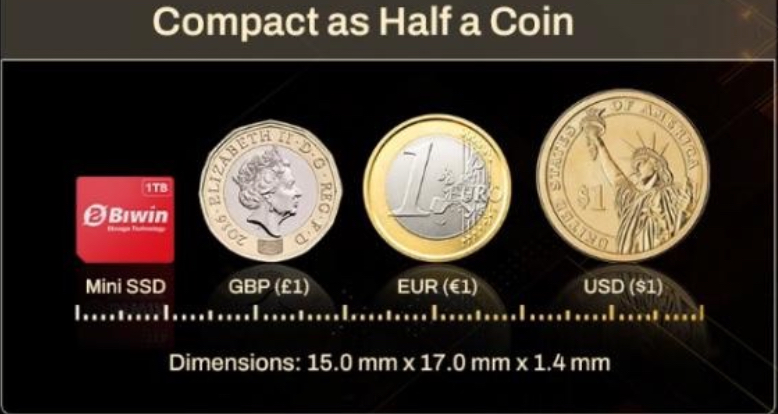
It has a capacity range of 512 GB to 2TB uses 3D TLC NAND, PCIe Gen 4 x2 and NVMe 1.4, delivering 3.7 GBs sequential read and 3.4 GBp ssequential write speed.
…
DataPelago released new benchmarks that show Nucleus, the company’s universal data processing engine, outperforms Nvidia’s cuDF data processing library for compute-intensive operations on GPUs. Results range from 4x to 38.6x speed increases, depending on the workload type. It says Nvidia GPUs have emerged as ideal for accelerating data processing, and cuDF has set the industry standard for what performance can be achieved on GPUs. However, cuDF struggles to handle complex and real-world workloads, limiting GPU performance for such workloads. Nucleus was designed to overcome these shortcomings. Both the press release and technical blog have full results.
…
dbt Labs provides an open-source SW framework to manage, transform, and model data in data warehouses. It’s launched a new global partner programme with structured partner tiers – Visionary, Advanced, and Registered, unified go-to-market models, and increased investment in enablement, laying the foundation for predictable, scalable growth across the dbt Labs partner ecosystem. The company passed the $100M ARR mark earlier this year. Marketplace transactions have grown more than 190 percent year-over-year. In addition, partner portal applications have recently increased more than 300 percent over historical weekly averages.
…
Dell announced availability of ObjectScale 4.1 software and the ObjectScale XF960 all-flash object storage appliance, initially announced it at Dell Tech World earlier this year. It is up to 2x faster than competitors, with 300% faster read throughput for critical AI operations like model training and fine-tuning. There are industry-leading compression ratios (up to 9:1) and scalable configurations supporting up to 47PB per rack. It has FIPS-certified encryption, TLS 1.3 support, and flexible erasure coding for robust data protection. You can read more about the ObjectScale news in a blog here and XF960 specs are here.

…
A Dell blog attacks VAST Data’s AI OS approach, saying “In an attempt to simplify AI infrastructure, some vendors are collapsing the stack — embedding data services, indexing, metadata engines, and even inference pipelines directly into the storage layer. On paper, it sounds elegant: one box, one vendor, one interface. But in practice? It’s a bottleneck disguised as simplicity.” Dell asserts “If collapsing the stack limits innovation, then the path forward is clear: separate the layers and optimize each one. Enterprises need an AI data platform that is modular by design — where storage performs as it should, data engines operate where it makes sense, and AI frameworks have the freedom to evolve.” A diagram shows its layered approach.
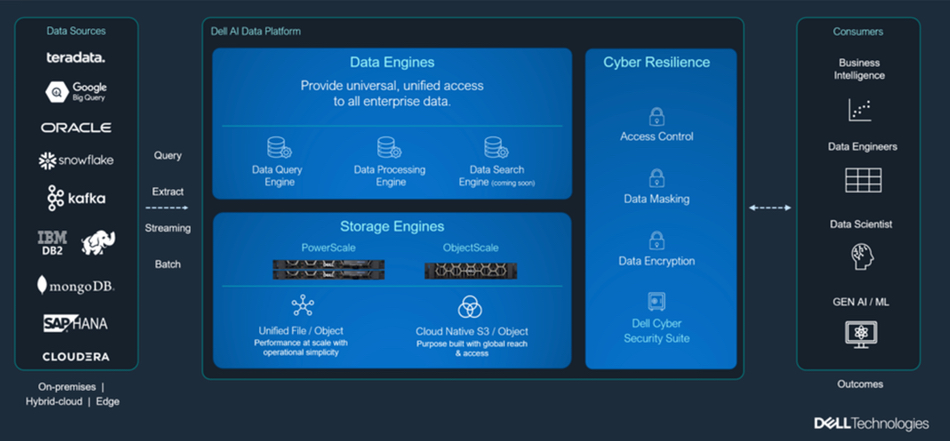
Author David Noy, Dell VP of Product Management, who used to work at VAST Data in the same role, says: “PowerScale transforms scale-out storage into a true parallel file system.”
…
EnterpriseDB (EDB) published independent research validating dramatic cost savings, energy efficiency, and emissions reductions that its sovereign data platform delivers to enterprise customers. Analyzing EDB Postgres AI (EDB PG AI) deployments at three Fortune 500 companies in the financial services sector, the research identified energy consumption reductions up to 81% and emissions reductions as high as 87%. Of three global financial institutions (EDB customers)—collectively representing one of five organizations in the world, with more than 150 data centers—EDB PG AI reduced emissions by more than 50% on average, with one customer achieving a 94% reduction for its Tier 1 applications and seeing an 81% drop in core usage.
EDB also launched the EDB Postgres AI Efficiency Calculator, an interactive tool that exposes inefficiencies in data estates and quantifies the financial, performance, and environmental impacts of addressing them. You can see how much EDB PG AI can reduce your operating costs, energy consumption, and carbon emissions by using the Efficiency Calculator, visit here.
…
HYCU says its R-Cloud is the only purpose-built system for backing up and recovering the entire legal SaaS stack, including iManage Cloud, Microsoft 365, DocuSign, and Box. HYCU commissioned a Vanson Bourne “State of SaaS Resilience 2025” report. It showed 85% of IT decision-makers in the business and professional services sector, including legal, believe that native SaaS platforms like iManage Cloud, Microsoft 365, DocuSign, and Box provide full data protection coverage, when they don’t. The SaaS shared responsibility model leaves customer, firms exposed to rising internal and external threats.
…
The ISS National Laboratory says “a cutting-edge orbital data center is set to launch to the International Space Station.” What this actually amounts to is Axiom Space and Red Hat is testing in-orbit computing on an Axiom Data Center Unit-1 (AxDCU-1) prototype powered by Red Hat Device Edge. It uses commercial server HW but we know no more than that. Axiom Space aims to build the world’s first commercial space station. Read more about the AxDCU-1 background here.
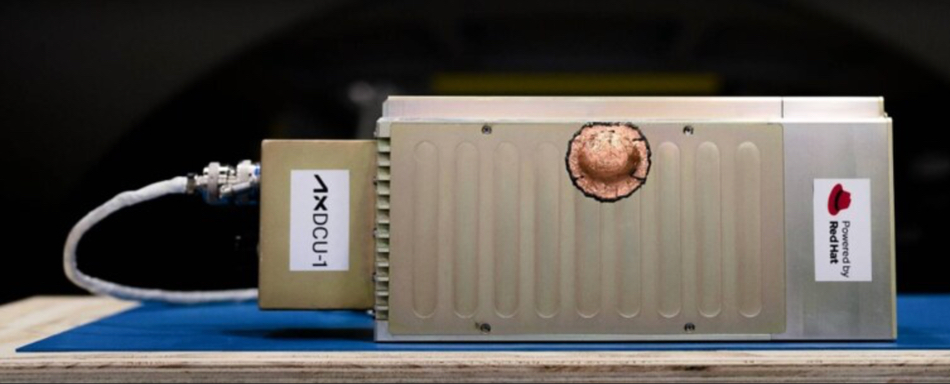
…
SaaS backup cloud provider Keepit has achieved its SOC 2 Type 1 attestation. The SOC 2 Type 1 report, developed by the American Institute of Certified Public Accountants (AICPA), evaluates the design of an organization’s internal controls related to key trust service principles at a specific point in time. Keepit’s Information Security and Legal teams worked closely with contributors from across the organization, including People and Culture, Quality Assurance, Delivery, Operations, Internal IT, and SOC teams. Together, they implemented and validated 108 distinct controls — covering the security and integrity of Keepit’s systems and processes. The SOC 2 Type 1 achievement builds on Keepit’s ISO 27001 certification. The next step is achieving the SOC 2 Type 2 report — a process already underway.
…
Keepit has produced another one of those surveys (see HYCU above) that show customers are unprotected unless they use the survey sponsor’s services. Its “Overlooked and under-protected: How the SaaS data gap threatens resilience” survey revealed that 37% of respondents rely solely on native backup capabilities, leaving organisations at risk of data loss and disruptions. Immutable, physically segregated data storage is seen as paramount alongside growing concerns over data and digital sovereignty. “As the survey data makes clear, relying on native backup is no longer enough. Organisations need to ensure their data is protected independently, immutably, and in alignment with evolving sovereignty requirements. In today’s environment, control over your data location and architecture isn’t just an IT preference — it’s a business imperative,” says Keepit SVP for business development Niels van Ingen.
The theme seems to be: “Scare them and they will come.”
…
Keepit has signed up Ingram Micro as its distributor in Canada. Keepit operates its own data centers in Canada, completely independent of global hyperscalers. This gives Canadian businesses full data sovereignty and a storage offering that’s always compliant with Canadian laws and regulations. The new go-to-market relationship is designed to bolster Keepit’s channel growth strategy in Canada. Value-added resellers (VARs), managed service providers (MSPs), and managed security service partners (MSSPs) can benefit from Keepit’s vendor-independent cloud solution for data backup and recovery through the Ingram Micro Xvantage digital experience platform.
…
Lightbits has a large U.S.-based financial institution case study in which its customer changed SAN block storage from Dell, and NetApp, using disaggregated, flexible, Ethernet-based Lightbits storage to augment Dell and replace NetApp systems. Download the case study here.
…
A Tom’s Hardware report says that the Microsoft Windows 11 security patch might be breaking SSDs under heavy workloads. Users report disappearing drives following file transfers, including some that cannot be recovered after a reboot.
…
Open-source object storage software supplier MinIO launched MinIO Academy, a centralized hub that brings together all the role-specific training resources and hands-on labs needed to master MinIO AIStor. In addition to paid enterprise and partner enablement subscriptions, the Academy will offer a free Quick Start program that includes a 60-day AIStor trial so people can get hands-on experience from the jump. Read more about it here.
…
Object First, which supplies an Ootbi object storage target backup appliance for Veeam customers, announced a 400% year-over-year increase in bookings for Q2 2025. The Ootbi box saw “strong growth in adoption, with year-over-year bookings up 76% in the U.S. and Canada, 364% in Latin America, and 961% in EMEA.” Object First achieved 225% year-over-year growth in its global customer base and 237% in its partner ecosystem in Q2 2025.
…
OWC launched its Express 1M2 80G portable SSD for creators in the field, mobile performance enthusiasts, and gamers. With over 6000MB/s real-world peak speeds, it is ThunderboltTM 5 compatible and delivered in a palm-sized, fanless form factor. The OWC Express 1M2 80G offers users the choice between DIY “build your own” and ready-to-run solutions, both of which are easily upgradable to higher capacities and compatible with Macs, PCs, iPad Pro, Chromebooks, and Surface devices featuring Thunderbolt 4, Thunderbolt 5, or USB4 connectivity. A solid aluminum, heatsink-like finned design ensures silent, throttle-free heat dissipation to support real-world peak speeds over 6000MB/s. The OWC Express 1M2 80G is available as a 0GB enclosure and in capacities up to 8TB.
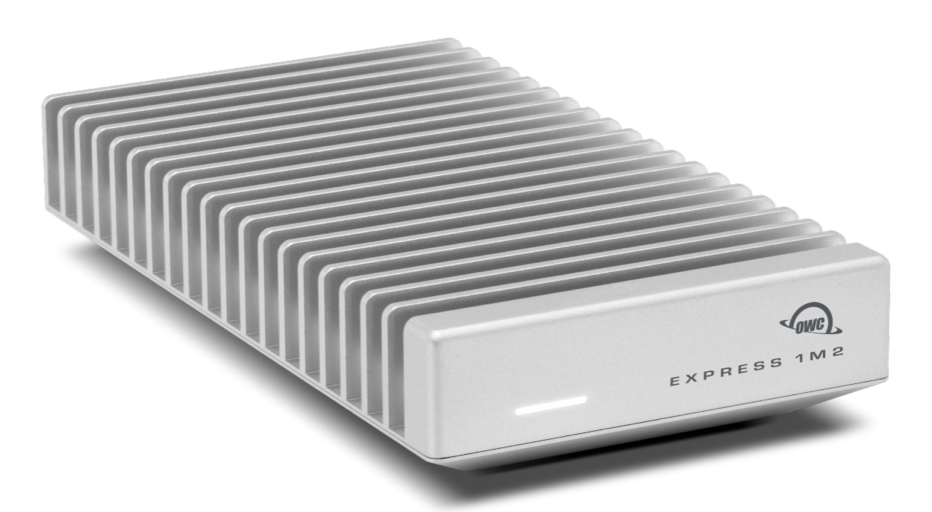
The OWC Express 1M2 80G is now generally available (GA) through OWC.com and Amazon.com and priced as follows: 0TB Enclosure – $219.00, 1TB – $349.00, 2TB – $499.00, 4TB – $699.00, 8TB – $1,299.00.
…
Tom’s Hardware reports SSD controller and drive supplier Phison has taken legal action over a falsified ‘leaked’ document on Windows SSD issues (see Microsoft paragraph above). It states: “We wish to state unequivocally that the document in question—reproduced below—is neither an official nor unofficial communication from Phison.”
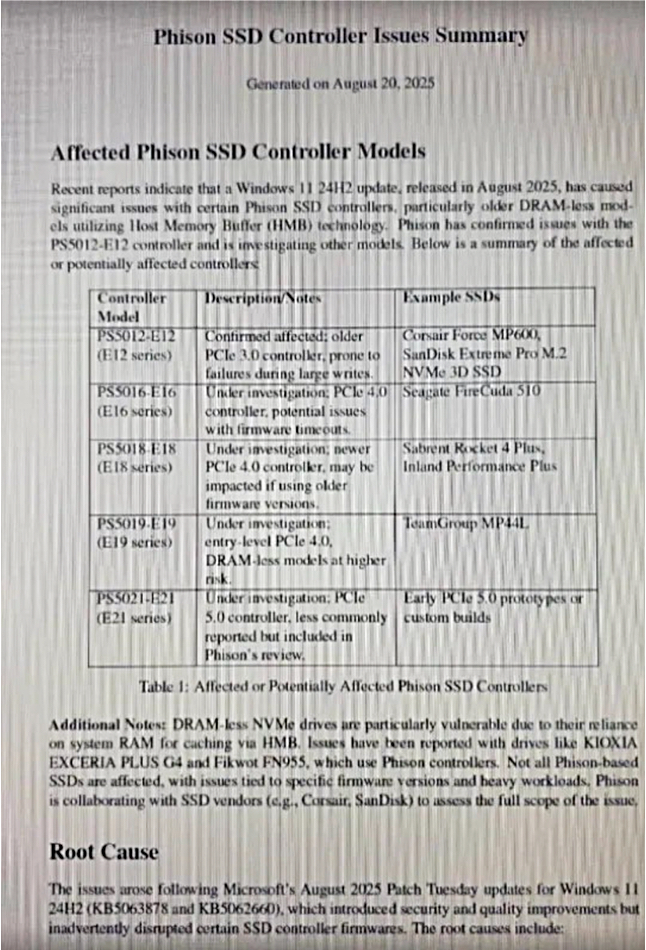
…
RedData and Carahsoft Technology Corp. announce a strategic partnership with Phison through which RedData is providing “RedData Powered by Phison” SSDs. RedData offers multiple products optimized for AI, storage security with self-encrypting drives (SEDs) and Government-grade Commercial Solutions for Classified (CSfC) ready products. RedData’s offerings are available through Carahsoft’s GSA Schedule No. 47QSWA18D008F, ITES-SW2 Contract W52P1J-20-D-0042, OMNIA Partners Contract #R191902, E&I Contract #EI00063~2021MA and The Quilt Master Service Agreement Number MSA05012019-F.
…
Enterprise private cloud company Platform9 announced its newest release of Private Cloud Director adds new AI hardware support and feature integration addressing top IT requirements for modern cloud to edge application management. Platform9 also unveiled a major new breakthrough capability of its migration tool, vJailbreak; it now has the ability to convert entire VMware vSphere clusters in place, keeping services online and minimizing business disruption while automating large-scale VM migrations. For more information look here.
…
Data integrity supplier Precisely announced a strategic technology partnership with data marketplace solution provider Opendatasoft. Together, they will deliver an integrated data marketplace designed to simplify access to trusted, AI‑ready data across businesses and teams – seamlessly and in compliance with governance requirements. It will will integrate with the Precisely Data Integrity Suite and combine the Suite’s robust data management capabilities with the intuitive, self‑service experience of Opendatasoft’s data sharing platform. Learn more here.
…
Vector database supplier Qdrant is hosting a global, virtual hackathon challenging developers to reimagine what’s possible with vector search. It says: “Forget the classical RAG chatbot! This is your chance to explore multi-modal applications, intelligent recommendations, and advanced vector search that go far beyond conversational interfaces.” It runs from now to Tuesday, Sep 16. There is over $10k in prizes from Qdrant, Mistral AI, CrewAI, Cognee, and more. It’s pen to participants worldwide with winners announced September 26 at Vector Space Day in Berlin and online. Details here.
…
Red Hat’s llm-d is a Kubernetes-native high-performance distributed LLM inference framework. The company has launched an llm-d Community to help power distributed Gen AI inference at Scale. Founding contributors are CoreWeave, Google Cloud, IBM Research and Nvidia. They’re joined by AMD, Cisco, Hugging Face, Intel, Lambda, Mistral AI, and university supporters at the University of California, Berkeley, and the University of Chicago. The project aims to make production generative AI as omnipresent as Linux. See an interactive demo and Introduction to llm-d here.
…
Syniti, part of Capgemini, has released research with the UK & Ireland SAP User Group exploring how organisations are managing their data, particularly ahead of S/4HANA migrations. It reveals how a more strategic, organisation-wide approach to data is starting to take shape, but many are still grappling with ownership, governance and skills. Key findings:
- Only 28% say their organisation has the necessary business or data skills to use their data effectively, meaning that almost three quarters
don’t have the skills or aren’t confident they do. - Nearly a quarter of organisations (23%) have no data governance in place, while just 39% actively check data quality before critical data
enters their system. - Only 14% are or were very confident about data migration activities before SAP / S/4HANA transformation. Less than one in six feel fully
prepared for one of the biggest IT projects they’ll face - 31% have no plans to implement a data archiving strategy for SAP S/4HANA. Nearly a third are heading into a major transformation without a plan to manage legacy data
Register to get the report here.
…
Data protector Zmanda says one of the world’s largest cybersecurity organizations chose Zmanda to protect classified data across seven data centers. It resulted in an over 50% cost savings compared to the previous system with zero custom code needed for comprehensive disaster recovery, and full compliance with stringent security requirements.
…


